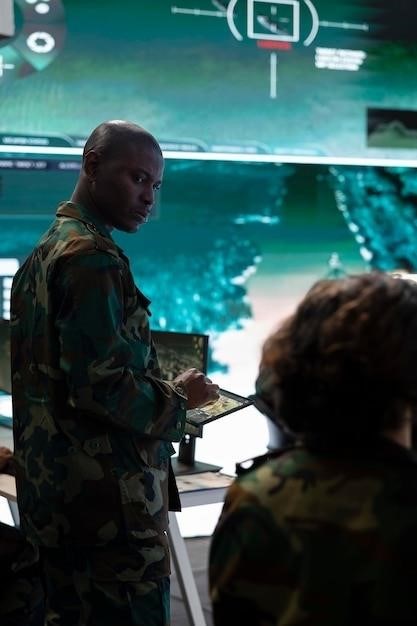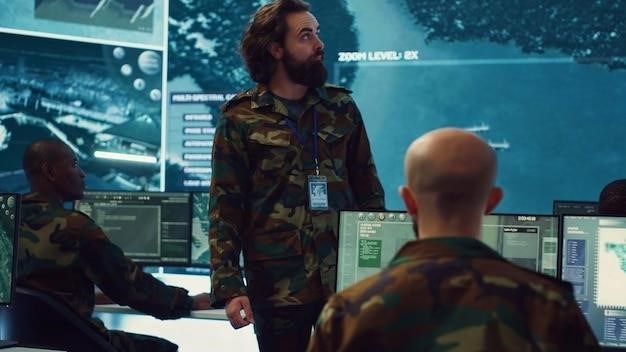Leading Marines⁚ A Comprehensive Guide
This guide offers a comprehensive overview of leading Marines‚ drawing from official Marine Corps publications and online resources. It explores core leadership principles‚ common challenges‚ effective communication strategies‚ and valuable resources like PDFs and online study materials. The guide also delves into leadership development tools such as mentorship and coaching techniques.
Core Leadership Principles in the Marine Corps
The Marine Corps’ leadership philosophy centers on a unique blend of service ethos and unwavering commitment to core values. These values—honor‚ courage‚ and commitment—form the bedrock of every Marine’s actions and decisions‚ shaping their leadership style. Effective Marine leaders exemplify these values daily‚ fostering trust and respect among their subordinates. Leading Marines isn’t merely about issuing orders; it’s about inspiring‚ motivating‚ and developing the potential within each individual. This involves understanding each Marine’s strengths and weaknesses‚ providing tailored guidance and mentorship‚ and creating an environment where Marines feel empowered to excel. The emphasis is on leading by example‚ demonstrating the same dedication‚ discipline‚ and integrity expected of those being led. The leadership principles aren’t abstract concepts; they are living‚ breathing realities that shape the conduct and character of every Marine leader. This approach emphasizes a holistic development of both character and skill‚ ensuring Marines are equipped to lead effectively in diverse and challenging environments. Effective leadership in the Marine Corps is a continuous learning process‚ requiring constant self-reflection and adaptation to dynamic situations. It’s about making sound judgments under pressure‚ communicating clearly and effectively‚ and always putting the needs of the mission and the Marines above personal gain.
Challenges Faced by Marine Leaders and Solutions
Marine leaders consistently face multifaceted challenges demanding adaptability and resilience. Maintaining high morale and cohesion within units‚ especially during extended deployments or high-stress operations‚ is paramount. Effective communication across ranks‚ ensuring clear understanding of objectives and expectations‚ often proves difficult due to operational tempo and communication constraints. Balancing mission requirements with the well-being of Marines requires careful judgment‚ as does adapting leadership styles to diverse personalities and skill sets within a unit. Furthermore‚ technological advancements and evolving operational environments necessitate continuous professional development‚ demanding leaders stay abreast of the latest strategies and technologies. Successfully navigating these challenges requires proactive leadership. Mentorship programs and robust communication channels can foster strong unit cohesion. Regular feedback sessions and transparent communication regarding mission objectives and potential risks build trust and understanding. Utilizing available resources for professional development‚ such as online platforms and leadership training courses‚ ensures leaders remain adaptable and effective. Prioritizing the well-being of Marines through stress management programs and providing opportunities for rest and recuperation is critical for maintaining morale and operational effectiveness. Ultimately‚ effective leadership in the Marine Corps demands a commitment to continuous learning‚ adaptability‚ and a strong emphasis on both mission accomplishment and the well-being of the Marines under their command.
Effective Communication Strategies for Marine Leaders
Effective communication is the cornerstone of successful leadership within the Marine Corps. Marine leaders must master various communication methods to ensure clear and concise conveyance of information across all ranks. This includes utilizing both verbal and written communication‚ adapting the style to the audience and context. For instance‚ direct and unambiguous orders are crucial in high-pressure situations‚ while more collaborative approaches are suitable for planning and problem-solving. Active listening is paramount‚ ensuring that leaders understand their Marines’ perspectives and concerns. Regular feedback sessions‚ both formal and informal‚ provide opportunities for open dialogue and address potential issues proactively. Leaders should leverage technology effectively‚ utilizing secure communication channels for sensitive information and employing readily accessible platforms for routine updates. Transparency in communication builds trust and fosters a cohesive unit. Openly sharing information about mission objectives‚ challenges‚ and successes promotes a shared understanding and commitment. However‚ leaders must also be mindful of security protocols and avoid disseminating classified or sensitive information inappropriately. Furthermore‚ utilizing various communication styles‚ such as storytelling and mentorship‚ can enhance understanding and build stronger relationships within the unit. Mastering nonverbal communication – through body language and tone – is equally crucial‚ conveying confidence and understanding. In conclusion‚ effective communication in the Marine Corps transcends mere information exchange; it’s a dynamic process that fosters trust‚ collaboration‚ and ultimately‚ mission success.

Utilizing Available Resources⁚ PDFs and Online Materials
Numerous online platforms and downloadable PDFs offer valuable resources for studying Marine Corps leadership. These materials provide comprehensive guides‚ practice questions‚ and answers related to the “Leading Marines” curriculum‚ enhancing understanding and exam preparation. Access to these resources is crucial for effective leadership development.
Accessing Leading Marines PDF Manuals and Guides
Locating authoritative PDF manuals and guides on “Leading Marines” can significantly aid in leadership development within the Marine Corps. Several avenues exist for accessing these crucial resources. The official Marine Corps website may offer downloadable publications‚ providing direct access to official doctrine and best practices. Additionally‚ reputable educational platforms and online bookstores often carry digital versions of relevant texts‚ potentially offering both complete manuals and supplemental study materials. These platforms frequently allow for easy searching and filtering by keyword‚ ensuring that users find the specific “Leading Marines” content they need. Remember to verify the credibility of any source before relying on its information‚ ensuring the materials are officially sanctioned or from trusted academic sources. Careful examination of publication dates is also important‚ as military doctrine and best practices can evolve over time. Utilizing these resources will provide a robust foundation for effective leadership skills.
Utilizing Online Platforms for Study Materials
The digital age offers a wealth of online platforms dedicated to supporting military education and leadership development. These platforms provide supplementary materials to enhance understanding of core leadership principles within the context of the Marine Corps. Websites such as Course Hero and Docsity‚ while not exclusively focused on the Marine Corps‚ often host shared documents‚ including study guides‚ practice questions‚ and summaries of key texts related to leadership. These user-generated resources can offer alternative perspectives and explanations of complex concepts. However‚ always critically evaluate the accuracy and reliability of such materials. Supplement these with official Marine Corps publications for the most accurate information. Furthermore‚ online forums and discussion boards can provide opportunities for peer-to-peer learning and knowledge sharing‚ fostering a collaborative approach to leadership development. Remember that while online resources are valuable‚ they should complement‚ not replace‚ official Marine Corps training and documentation.
Exam Prep Resources⁚ Practice Questions and Answers
Preparing for examinations on leadership within the Marine Corps requires dedicated effort and the utilization of effective study tools. Numerous online resources offer practice questions and answers designed to simulate the format and content of official exams. While some websites provide free access to sample questions‚ others may offer comprehensive question banks for a fee. These resources can be invaluable in identifying knowledge gaps and reinforcing understanding of key concepts. However‚ it’s crucial to use these resources judiciously. Relying solely on practice questions without thoroughly understanding the underlying principles can be detrimental. Always cross-reference answers with official Marine Corps doctrine and publications to ensure accuracy. Furthermore‚ focus on understanding the why behind the answers‚ not just memorizing them. This approach will foster deeper learning and better prepare you for the challenges of leading Marines. Remember that consistent‚ focused study is more effective than last-minute cramming.

Leadership Development Tools and Techniques
Effective Marine leadership hinges on robust development tools. Mentorship programs provide invaluable guidance‚ while coaching and counseling sessions refine leadership skills. These techniques foster growth and ensure Marines are equipped to excel in their roles.
Mentorship and its Importance in the Marine Corps
Mentorship within the Marine Corps is not merely a suggestion; it’s a cornerstone of leadership development. The Marine Corps recognizes the profound impact experienced Marines can have on shaping the next generation of leaders. Mentorship transcends simple instruction; it’s about fostering a bond of trust and mutual respect‚ where knowledge‚ experience‚ and wisdom are shared in a supportive and challenging environment. A mentor provides guidance not just on professional skills but also on navigating the complexities of military life and personal growth. This personalized approach ensures Marines develop not only the technical proficiency but also the emotional intelligence and resilience crucial for effective leadership. Access to quality mentorship translates into a more capable and confident leadership corps‚ better equipped to handle the demands of service and uphold the high standards of the Marine Corps. The emphasis on mentorship underscores the Corps’ commitment to nurturing its leaders‚ ensuring that each Marine receives the support needed to reach their full potential‚ contributing to a stronger and more effective organization. The value of mentorship is widely acknowledged in various leadership development programs‚ and the Marine Corps actively promotes and encourages the mentor-mentee relationship.
Coaching and Counseling Marines for Effective Leadership
Effective leadership in the Marine Corps relies heavily on the ability to coach and counsel Marines. Coaching focuses on developing skills and improving performance‚ often through targeted feedback and goal setting. A coach helps Marines identify strengths and weaknesses‚ providing constructive criticism to enhance their leadership capabilities. This might involve role-playing scenarios‚ analyzing past performances‚ or developing personalized training plans. Counseling‚ on the other hand‚ addresses personal issues and challenges that may affect a Marine’s performance or well-being. It provides a safe and confidential space for Marines to discuss concerns‚ explore solutions‚ and receive support. This could range from addressing performance deficiencies to providing guidance on personal matters impacting their professional life. Both coaching and counseling are essential tools for leaders at all levels. They demonstrate a commitment to the individual Marine’s growth and well-being‚ fostering a positive and supportive environment where Marines feel valued and empowered. The combination of these approaches creates a robust leadership development system‚ ensuring Marines are prepared to lead effectively in diverse and demanding situations. The skills of coaching and counseling are explicitly taught within Marine Corps leadership training.
